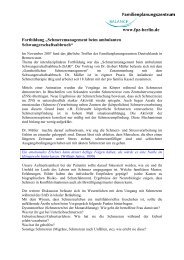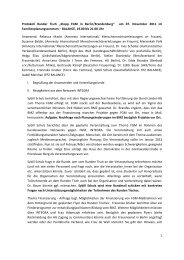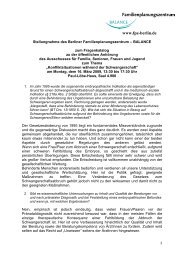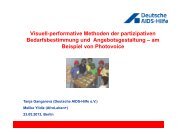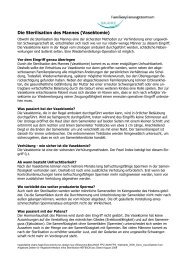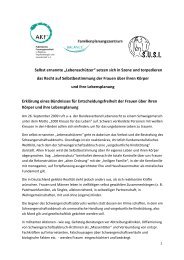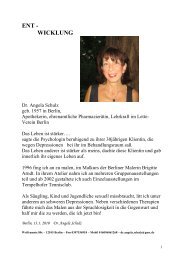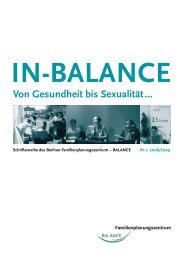Listening to African Voices - FPZ
Listening to African Voices - FPZ
Listening to African Voices - FPZ
Create successful ePaper yourself
Turn your PDF publications into a flip-book with our unique Google optimized e-Paper software.
Daughters who were born in Africa and who migrate duringchildhood <strong>to</strong> Europe often undergo the practice before arrivingin Europe. The probability depends on the age of the girlat the moment of migration and the age at which FGM/C isusually carried out in the community of origin.Daughters who were born in Germany are the lowest riskgroup. Depending on their family in the country of origin (orin France or Italy), they might be subjected <strong>to</strong> the practiceduring holidays or extended stays in the country of origin.The girls growing up in Hamburg belong – of course – <strong>to</strong>the second and third group. The fi ndings showed that thereis a small, but considerable number of girls who underwentFGM/C before coming <strong>to</strong> Hamburg. Further, the researchteam judged that 13 daughters of immigrants were at riskfor FGM/C during trips home. This indicates that otherolder girls have already taken that path and returned <strong>to</strong>Hamburg after undergoing FGM/C. There is therefore arelatively small number of girl children in Hamburg whohave been subjected <strong>to</strong> the practice or risk being subjected<strong>to</strong> it in the future.The research could not establish any evidence that FGM/Chas been carried out in Hamburg or other locations inGermany. There were only vague indications that it could bepracticed on infants from the ethnic group of the Yoruba orIgbo of Nigerian origin.If girls are subjected <strong>to</strong> the practice, the parents prefer <strong>to</strong>send them for an extended stay <strong>to</strong> the country of origin or,in some cases, <strong>to</strong> France. In order <strong>to</strong> determine whether aparticular girl is at risk, numerous fac<strong>to</strong>rs have <strong>to</strong> be takenin<strong>to</strong> account. The prevalence rate of the region of originis just one of many fac<strong>to</strong>rs. The place of residence (urban/rural), the ethnic group affiliation, the education level of theparents, the socio-demographic profile and opinions of thetwo parents, the level of integration in<strong>to</strong> German way, theirattachment <strong>to</strong> their home community are just a few variables<strong>to</strong> be assessed. The findings illustrate, however, thatthe group of girls at risk are a rather small minority. Mostimmigrants in Hamburg from practicing families abstain fromsubjecting their daughters <strong>to</strong> FGM/C for one or more of thefollowing reasons:• Fear of punishment, as the act might be discovered forexample during health check ups or swimming lessons.When immigrants have <strong>to</strong> decide between jeopardisingtheir status and continuing the practice of FGM/C,they will opt in favour of maintaining their status. Havingmigrated for labour, they have large families <strong>to</strong> supportin Africa and returning <strong>to</strong> Africa without having made afortune is not an option for them.• High level of education and integration and awarenessabout the risks and harmful consequences of FGM/C;• The other parent is from a non-practicing community andis opposed <strong>to</strong> the practice;• Lack of opportunities due <strong>to</strong> the absence of the societalsetting of the community of origin, including a network oftraditional or modern practitioners;• Flights <strong>to</strong> Africa are expensive and many immigrants don’thave the means <strong>to</strong> fl y the daughter home for this reasonexclusively;• Other more urgent preoccupations related <strong>to</strong> their statusas immigrants (e. g. linked <strong>to</strong> accommodation, residence orwork permit).Nonetheless, if a girl is from a practicing group, the risk cannever be <strong>to</strong>tally eliminated.6.6. Summary of the situation of the immigrant populations(per country of origin)6.6.1. Typologies of different immigrant communitiesThe analysis of the immigrant populations by country and byregion of origin enabled <strong>to</strong> classify most countries and someparticular regions in a typology based on the three elements:the FGM/C prevalence in the country or region of origin,the proportion of women who have undergone FGM/C aswell as the degree of risk experienced by girls growing upin Hamburg that they might be subjected <strong>to</strong> the practice.For three countries – Ghana, Benin and Togo – the nationalFGM/C prevalence proved <strong>to</strong> be an unreliable indica<strong>to</strong>r andpreference was given <strong>to</strong> distinguishing immigrants fromthese countries according <strong>to</strong> their region of origin.The typologies according <strong>to</strong> the three elements namedabove allow the determination of the need for interventionagainst FGM/C.• First, there are immigrant populations with a pressingneed for intervention: many women have been subjected<strong>to</strong> the practice and might be in need of assistance and thefindings indicated the existence of girls at risk of beingsubjected <strong>to</strong> the practice.• Second, there are communities with moderate need for intervention:there is a moderate or high number of womenconcerned, but due <strong>to</strong> the level of education and integrationor other characteristics of the immigrant community,the immigrants show little or no interest in continuing <strong>to</strong>practice FGM/C.• Finally, there are immigrant populations from Sub-SaharanAfrica with little or no need for intervention: FGM/Cis not part of their cultural practices. It still makes sense<strong>to</strong> include these populations in campaigns against FGM/Cas they can make valuable contributions <strong>to</strong> the discus-90<strong>Listening</strong> <strong>to</strong> <strong>African</strong> <strong>Voices</strong>






